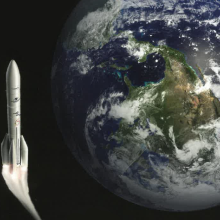Student work on the following topics can be found in the Institute's calls for proposals under "Space Transport Technology" or on request from the contact persons.
Current Projects
Design not to Demise
Sustainable end-of-life management is essential for the future of spaceflight. Focusing on large space structures, system concepts for a non-destructive ("design not to demise") disposal of space objects are investigated. This work covers among others the following topics:
- Mission analysis for EDL systems
- EDL System Design
- Novel design concepts for decelerators
Exploitation of the ‘Very Low Earth Orbit‘ regime (VLEO)
Development of methods for the targeted exploitation of the aerodynamic forces in this regime for orbit control purposes. This enables applications such as the propellant-free control of the relative motion of multiple satellites (formation flight) or the execution of maneuvers to reduce the risk of collision with space debris for any satellite without dedicated propulsion system (e.g. the institute’s own 'Flying Laptop‘ satellite).
Water propulsions system
The IRS is developing a water propulsion system that uses electrolysis in space to generate hydrogen and oxygen and uses them as fuel. This offers a green alternative to current hydrazine engines, which face a ban in the coming years due to the European REACH regulation.
The propulsion system is scheduled to be deployed in 2025 as part of the ROMEO (Research and Observation in Medium Earth Orbit –> Link auf Projektseite) academic small satellite developed by the IRS. The main goal of the mission is to explore Medium Earth Orbit and demonstrate a future alternative to the heavily utilized LEO. Novel technologies will be tested and their suitability within the radiation belt demonstrated.
Life cycle asessment of space transportation systems
In order to investigate the environmental impact of rockets, the project "Analysis for the ecological impact of space transportation systems" is carried out at the IRS. Using common LCA methodology, the following phases are investigated:
- Impact of design & production on the environment
- Emissions during launch
- Environmental impact of re-entry
The International Planetary Sunshade (IPSS)
To meet the climate goals, within the scope of a comprehensive systems analysis, the possibilities for optimizing the effects of the climate crisis on a global as well as local level by using a logistically as well as technologically modeled sunshade constellation - the International Planetary Sunshade - are being investigated. The project includes, among others, the following key aspects:
- Development of a digital IPSS model within an international open-source modeling platform
- Integration of sustainable concepts using space resources
- Linking of technological models with potential climate models
Kontakt

Stefanos Fasoulas
Prof. Dr.-Ing.Professor of Space Transportation Technology, Managing Director, Dean of Studies at Faculty 6 - Aerospace Technology and Geodesy







